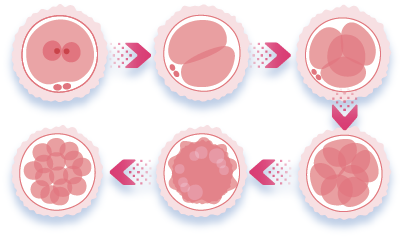In Vitro Fertilization
In in-vitro fertilization, eggs are removed surgically from the female ovaries and fertilized with sperms in the laboratory. The fertilized eggs are cultured for 2 to 6 days to form embryos before being transferred back to the uterus. This procedure is usually carried out along with ovarian stimulation to increase the number of eggs available.
In Vitro Fertilization Procedure
STAGE 1: Professional Assessment and Diagnosis
Before the treatment, patients meet with physicians to have a better understanding of their health condition. In order to identify the cause of infertility, investigations may be required, for example blood hormone tests, pelvic ultrasound scan, hysterosalpingogram and semen analysis, etc.
STAGE 2: Explanation of the Treatment Plan and Risks
When a suitable treatment is planned, our physicians & nursing staff will explain the treatment details, risks, success rates and charges.
STAGE 3: Signing of Consent Forms
After explaining the treatment process and risks in detail, the couple will be asked to sign a consent form in presence of the attending physician and nursing staff to ensure that all the terms and conditions are understood. (The consent form is based on the guidelines from the Council on Human Reproductive Technology).
STAGE 4: Ovarian Stimulation
Physician will plan a suitable treatment with each couple according to their physical condition.
STAGE 5: Follicular Development Monitoring and Ovulation Induction
STAGE 6: Egg Retrieval and Semen Collection
Points to note before the operation:
- Avoid eating or drinking 6 hours before the operation
- Contact lens and accessories must be removed
- Do not use any perfume or markup
- Nail polish must also be removed
- Take medication prescribed by the doctor
Egg retrieval:
This procedure takes about 45 minutes. During the operation, patients will receive anaesthesia (MAC or intravenous sedation) and pain killer. Egg collection will be done under ultrasound guidance. The collected eggs will be cultured in the laboratory.
Semen Collection:
The semen sample will be sent to the laboratory for analysis and processing at the time of egg retrieval. Sperms with the best quality will be chosen for insemination.
STAGE 7: Insemination and Embryo Culture
Washed sperms will be incubated with eggs for in-vitro fertilization. In cases of male factor infertility, embryologists will select quality sperms and inject a single sperm directly into the egg using intracytoplasmic sperm injection technique (ICSI). The eggs shall be cultured and observed for fertilization and embryonic development. Embryo transfer usually takes place 2 – 5 days following egg retrieval. The day of transfer depends on the quantity, quality and development stage of the embryos.
Embryo Development

STAGE 8: Embryo Transfer
Points to note before Embryo Transfer:
- NO fluid or food restriction before the operation
- Take medication as prescribed by the doctor
- Maintain a moderately full bladder during the operation
Points to note after Embryo Transfer:
- Relax and maintain a balanced diet
- Avoid eating papaya, banana and bitter gourd
- Do not carry heavy objects
- Avoid vigorous exercise, e.g. swimming, running, cycling
- Avoid sexual intercourse for the first two weeks after the transfer
- Do not drink coffee, tea or alcoholic drinks. Avoid eating uncooked food and unpasteurized dairy products
- Do not smoke
- Do not take any medicine without the doctor’s approval
- Do not visit sauna, massage facilities or hot spring
- Lengthy bedrest is not required
- Avoid close contact with people who have respiratory tract symptoms e.g. fever, cough and avoid direct contact with animal waste